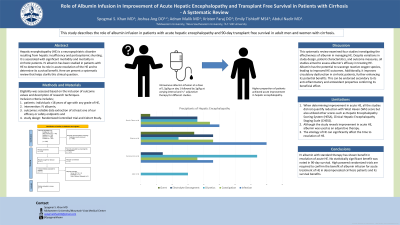Tuesday Poster Session
Category: Liver
P3808 - Role of Albumin Infusion in Improvement of Acute Hepatic Encephalopathy and Transplant Free Survival in Patients With Cirrhosis
Tuesday, October 24, 2023
10:30 AM - 4:00 PM PT
Location: Exhibit Hall

Has Audio
.jpg)
Spogmai S. Khan, MD
Mountain Vista Medical Center
Mesa, AZ
Presenting Author(s)
Spogmai Khan, MD, Josh Ang, DO, Adnan Malik, MD, Kristen Farraj, DO, Emily Tishkoff, , Abdul Nadir, MD
Mountain Vista Medical Center, Mesa, AZ
Introduction: Hepatic encephalopathy (HE) is a neuropsychiatric disorder can occur rapidly leading to significant morbidity and mortality in patients with cirrhosis. The current standard therapy consists of lactulose and/or rifaximin. This systematic review evaluates the role of intravenous albumin in hepatic encephalopathy managment its potential survival benefits with standard therapy.
Methods: Five databases including, PubMed, Web of Science, Scopus, Medline, and Embase, were screened from January 2012 till October 2022. Two independent investigators assessed study eligibility, synthesized evidence, and evaluated the quality of the included studies using the revised Joanna Briggs Institute (JBI) critical appraisal tool. The primary and secondary outcomes were improvement in acute hepatic encephalopathy and transplant free survival respectively.
Results: Albumin infusion was associated with improvement in acute hepatic encephalopathy on day 1-3 and day 10. Two studies signified increase in transplant free survival in patients with HE. More prospective clinical trials are required to investigate clinical effects of albumin on HE and related mortality.
Discussion: This systematic review examined four studies investigating the effectiveness of albumin infusion in managing hepatic encephalopathy. Despite variations in study design, patient characteristics, and outcome measures, all studies aimed to assess albumin's efficacy in treating HE. Albumin has the potential to scavenge reactive oxygen species, leading to improved HE outcomes. Additionally, albumin was shown to improve circulatory dysfunction in cirrhotic patients, further enhancing its potential benefits. This can be endorsed secondary to its anti-inflammatory and antioxidant properties conferring its benefit effect. When determining improvement in acute HE, all the studies did not quantify reduction with West Haven (WH) score but also utilized other scores such as Hepatic Encephalopathy Scoring System (HESA) and Clinical hepatic encephalopathy staging scale (CHESS). Large randomized control trials are required to validate the results. Second, although the study reveals improvement in acute HE, albumin was used as an adjunctive therapy. Third, the etiology of HE can significantly affect the time to resolution of HE. The mixed results of included studies suggest that albumin use in HE may not be universally applied. This failure for generalizability may be attributed to variability of patient characteristics and etiology of HE.

Disclosures:
Spogmai Khan, MD, Josh Ang, DO, Adnan Malik, MD, Kristen Farraj, DO, Emily Tishkoff, , Abdul Nadir, MD. P3808 - Role of Albumin Infusion in Improvement of Acute Hepatic Encephalopathy and Transplant Free Survival in Patients With Cirrhosis, ACG 2023 Annual Scientific Meeting Abstracts. Vancouver, BC, Canada: American College of Gastroenterology.
Mountain Vista Medical Center, Mesa, AZ
Introduction: Hepatic encephalopathy (HE) is a neuropsychiatric disorder can occur rapidly leading to significant morbidity and mortality in patients with cirrhosis. The current standard therapy consists of lactulose and/or rifaximin. This systematic review evaluates the role of intravenous albumin in hepatic encephalopathy managment its potential survival benefits with standard therapy.
Methods: Five databases including, PubMed, Web of Science, Scopus, Medline, and Embase, were screened from January 2012 till October 2022. Two independent investigators assessed study eligibility, synthesized evidence, and evaluated the quality of the included studies using the revised Joanna Briggs Institute (JBI) critical appraisal tool. The primary and secondary outcomes were improvement in acute hepatic encephalopathy and transplant free survival respectively.
Results: Albumin infusion was associated with improvement in acute hepatic encephalopathy on day 1-3 and day 10. Two studies signified increase in transplant free survival in patients with HE. More prospective clinical trials are required to investigate clinical effects of albumin on HE and related mortality.
Discussion: This systematic review examined four studies investigating the effectiveness of albumin infusion in managing hepatic encephalopathy. Despite variations in study design, patient characteristics, and outcome measures, all studies aimed to assess albumin's efficacy in treating HE. Albumin has the potential to scavenge reactive oxygen species, leading to improved HE outcomes. Additionally, albumin was shown to improve circulatory dysfunction in cirrhotic patients, further enhancing its potential benefits. This can be endorsed secondary to its anti-inflammatory and antioxidant properties conferring its benefit effect. When determining improvement in acute HE, all the studies did not quantify reduction with West Haven (WH) score but also utilized other scores such as Hepatic Encephalopathy Scoring System (HESA) and Clinical hepatic encephalopathy staging scale (CHESS). Large randomized control trials are required to validate the results. Second, although the study reveals improvement in acute HE, albumin was used as an adjunctive therapy. Third, the etiology of HE can significantly affect the time to resolution of HE. The mixed results of included studies suggest that albumin use in HE may not be universally applied. This failure for generalizability may be attributed to variability of patient characteristics and etiology of HE.

Figure: Descriptive Table of the Studies Reviewed
Disclosures:
Spogmai Khan indicated no relevant financial relationships.
Josh Ang indicated no relevant financial relationships.
Adnan Malik indicated no relevant financial relationships.
Kristen Farraj indicated no relevant financial relationships.
Emily Tishkoff indicated no relevant financial relationships.
Abdul Nadir indicated no relevant financial relationships.
Spogmai Khan, MD, Josh Ang, DO, Adnan Malik, MD, Kristen Farraj, DO, Emily Tishkoff, , Abdul Nadir, MD. P3808 - Role of Albumin Infusion in Improvement of Acute Hepatic Encephalopathy and Transplant Free Survival in Patients With Cirrhosis, ACG 2023 Annual Scientific Meeting Abstracts. Vancouver, BC, Canada: American College of Gastroenterology.
